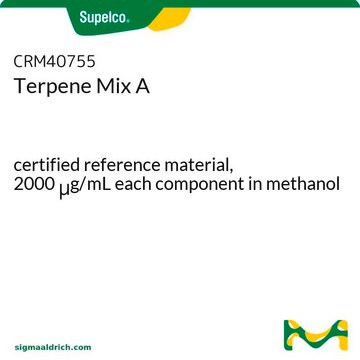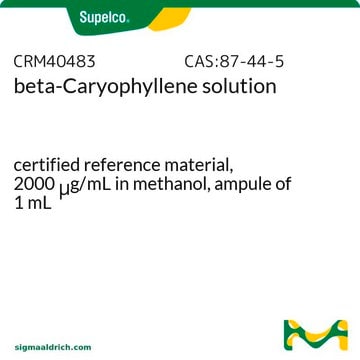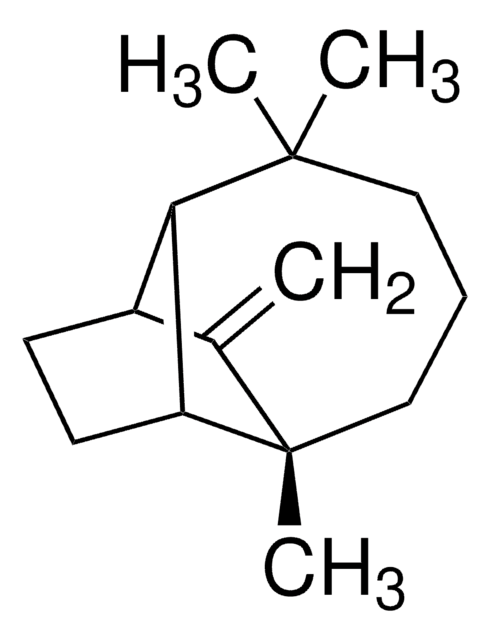22076
(−)-Caryophyllene oxide
≥99.0% (sum of enantiomers, GC)
Synonym(s):
β-Caryophyllene epoxide, (−)-Epoxycaryophyllene, (−)-Epoxydihydrocaryophyllene, (1R,4R,6R,10S)-9-Methylene-4,12,12-trimethyl-5-oxatricyclo[8.2.0.04,6]dodecane, trans-Caryophyllene oxide
About This Item
Recommended Products
Assay
≥99.0% (sum of enantiomers, GC)
form
solid
optical activity
[α]20/D −71±1°, c = 2% in chloroform
mp
61-63 °C
62-63 °C (lit.)
application(s)
metabolomics
vitamins, nutraceuticals, and natural products
storage temp.
2-8°C
SMILES string
[H][C@@]12CCC(=C)[C@@]3([H])CC(C)(C)[C@]3([H])CC[C@@]1(C)O2
InChI
1S/C15H24O/c1-10-5-6-13-15(4,16-13)8-7-12-11(10)9-14(12,2)3/h11-13H,1,5-9H2,2-4H3/t11-,12-,13-,15-/m1/s1
InChI key
NVEQFIOZRFFVFW-RGCMKSIDSA-N
Looking for similar products? Visit Product Comparison Guide
General description
Application
- as an antimicrobial agent to study its effects against Gram-positive, Gram-negative and yeast strains
- as a commercial standard to perform quantification analysis of constitutes from Marchantia polymorpha extracts using gas chromatography with flame-ionization detection (GC-FID)
- as a reference standard to analyze the enantiomeric ratios of Achillea ligustica essential oil constituents using gas chromatography-mass spectrometry (GC-MS)
Biochem/physiol Actions
Other Notes
Signal Word
Warning
Hazard Statements
Precautionary Statements
Hazard Classifications
Aquatic Chronic 2 - Eye Irrit. 2 - Skin Irrit. 2
Storage Class Code
11 - Combustible Solids
WGK
WGK 2
Flash Point(F)
230.0 °F - closed cup
Flash Point(C)
110 °C - closed cup
Personal Protective Equipment
Certificates of Analysis (COA)
Search for Certificates of Analysis (COA) by entering the products Lot/Batch Number. Lot and Batch Numbers can be found on a product’s label following the words ‘Lot’ or ‘Batch’.
Already Own This Product?
Find documentation for the products that you have recently purchased in the Document Library.
Customers Also Viewed
Our team of scientists has experience in all areas of research including Life Science, Material Science, Chemical Synthesis, Chromatography, Analytical and many others.
Contact Technical Service









